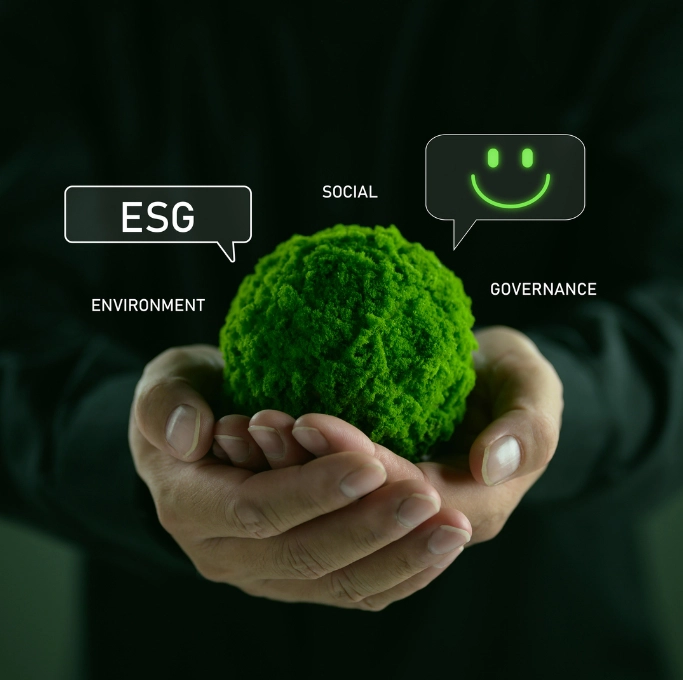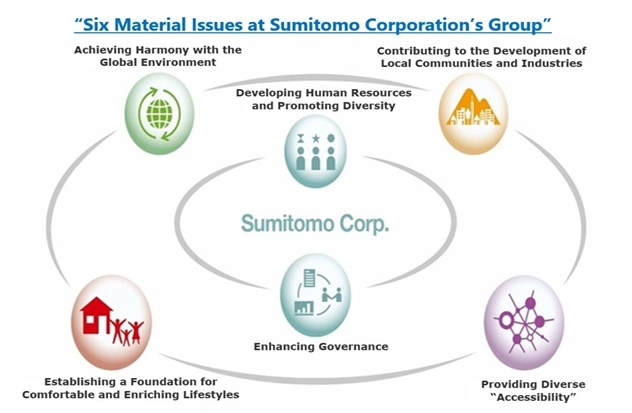Social Initiatives for Supply Chain Management
Sumitomo Corporation Group has initiated CSR activities and aims to build a sustainable society by working with our business partners and stakeholders to achieve responsible supply chain management.
The company provides numerous opportunities to promote understanding and adherence to these principles, including training for new employees, workshops for local and international employees, and preparations for overseas assignments.
If violations of these rules are identified within our supply chain, we will promptly request corrective actions from our business partners, contractors, and other relevant parties, providing support as necessary. However, if no improvements are made, we will carefully reconsider our business relationships with those involved.
Sumitomo Corporation Group CSR Guidelines for Supply Chain Management
Established: November 2009
Revised: November 2013
Sumitomo Corporation Group strives to be a global organization that continuously moves forward, adapting to change, creating new value, and contributing to society on a broad scale. We are committed to achieving success while recognizing the importance of all stakeholders through ethical business practices.
To promote sustainability and societal well-being in line with our corporate mission, Sumitomo Corporation Group has established these CSR guidelines for supply chain management. Our goal is to strengthen our global relationships, which are foundational to our integrated corporate strengths. We ask our business partners and stakeholders to understand and adhere to these guidelines to achieve responsible supply chain management together.
Expectations for Our Business Partners and Stakeholders :
- Respect human rights and refrain from participating in any human rights violations.
- Prevent forced labor, child labor, and unfair wage practices.
- Avoid discriminatory employment practices.
- Respect employees' rights to free participation, ensuring open and fair labor-management negotiations.
- Provide a safe and healthy working environment.
- Protect the global environment and consider biodiversity appropriately.
- Ensure the quality and safety of goods and services.
- Conduct fair business practices, comply with all relevant laws and regulations, and prevent bribery, intimidation, and other corrupt business practices.
- Maintain appropriate information security management.
- Cooperate with local community members and contribute to the sustainable development of regional areas.
- Disclose information related to these matters in a timely and appropriate manner.
Respect for Human Rights
Sumitomo Corporation Group Human Rights Policy Established: May 2020
Sumitomo Corporation declares in its management principles that our goal is to be a global organization that contributes to society broadly while upholding the highest respect for individuals. To fulfill our corporate social responsibility and achieve sustainable growth with society, we respect human rights.
Sumitomo Corporation became a signatory to the United Nations Global Compact’s Ten Principles in 2009, supporting universally recognized values related to human rights and labor. We also adhere to the International Human Rights Law, the ILO Declaration on Fundamental Principles and Rights at Work, and the UN Guiding Principles on Business and Human Rights.
- Scope of Application
Sumitomo Corporation ensures that all its executives and employees comply with their responsibility to respect human rights. We also encourage our business partners and stakeholders to adopt, understand, and comply with this policy so that we can work together to fulfill our social responsibilities and uphold human rights throughout the value chain.
- Human Rights Due Diligence
Sumitomo Corporation is committed to identifying, preventing, and mitigating negative human rights impacts through human rights due diligence processes. If we identify that our group's practices cause or contribute to adverse human rights impacts, we will take appropriate remedial measures.
- Compliance with Applicable Laws
Sumitomo Corporation complies with national and regional laws related to its operations. When such laws are inconsistent with internationally recognized human rights, we strive to respect international human rights norms.
- Stakeholder Engagement
Sumitomo Corporation will continue to refine and improve its human rights measures through engagement and dialogue with relevant stakeholders.
- Education
Sumitomo Corporation will provide appropriate training to executives and employees to ensure effective implementation of this human rights policy.
- Reporting
Sumitomo Corporation will disclose relevant information and remain committed to respecting human rights.
Statement of Sumitomo Corporation Group on the UK Modern Slavery Act 2015
The Sumitomo Corporation Group has established measures to ensure that modern slavery and human trafficking do not occur within its business operations or supply chains. As a member of the Sumitomo Corporation Group, the Board of Directors of Sumisho Global Logistics Co., Ltd. has approved the Sumitomo Corporation Group's Statement on Modern Slavery and Human Trafficking, which was published on September 27, 2021.
Commitment to the UN Global Compact
In March 2009, the Sumitomo Corporation Group signed the United Nations Global Compact, declaring its support for the Ten Principles. Since this international CSR initiative shares the same values as our corporate mission, we are raising awareness among our officers and employees worldwide about its objectives. We continuously strive to enhance corporate value by identifying areas for improvement within our business activities, ensuring alignment with the values upheld by the Ten Principles.
Furthermore, we actively engage in the Local Network Japan, the Global Compact Network Japan, as one of the Board Member Companies. In fiscal year 2017, we participated in working groups on: Environmental management related to climate change, biodiversity, and other environmental issues, Human rights due diligence reporting, Sustainable Development Goals (SDGs), Socially Responsible Investment (SRI) / Environmental, Social, and Governance (ESG) initiatives
Through this participation, we have gained insights into the latest global trends, learned from leading initiatives, and acquired expert knowledge. This knowledge has been utilized to help the company advance its Corporate Social Responsibility (CSR) efforts.
What is the Global Compact?
The Global Compact (GC) was proposed by former UN Secretary-General Kofi Annan at the World Economic Forum (Davos) in 1999 and officially launched in 2000 at the UN headquarters in New York. The GC is an initiative aimed at achieving sustainable global economic growth through the voluntary participation of businesses in a worldwide network.
The UN invites companies and organizations worldwide to participate in the GC, and currently, more than 13,000 companies and organizations from about 160 countries have joined.
The GC is based on ten universally accepted principles covering human rights, labor standards, the environment, and anti-corruption. Participating companies integrate these principles into their business operations and strategies, acting as responsible and innovative corporate citizens.
The Ten Principles of the Global Compact
Human Rights
- Businesses should support and respect the protection of internationally proclaimed human rights; and
- Ensure that they are not complicit in human rights abuses.
Labour Standards
- Businesses should uphold the freedom of association and the effective recognition of the right to collective bargaining;
- Eliminate all forms of forced and compulsory labour;
- Ensure the effective abolition of child labour; and
- Eliminate discrimination in respect of employment and occupation.
Environment
- Businesses should support a precautionary approach to environmental challenges;
- Undertake initiatives to promote greater environmental responsibility; and
- Encourage the development and diffusion of environmentally friendly technologies.
Anti-Corruption
- Businesses should work against corruption in all its forms, including extortion and bribery.
*We also support the Universal Declaration of Human Rights, which derives from the Ten Principles of the UN Global Compact Social and Environmental Activities
"SGLT has implemented environmental control regulations to oversee subcontractors, partners, and suppliers in accordance with 'Environmental Regulations' to prevent any actions that may have an impact."



